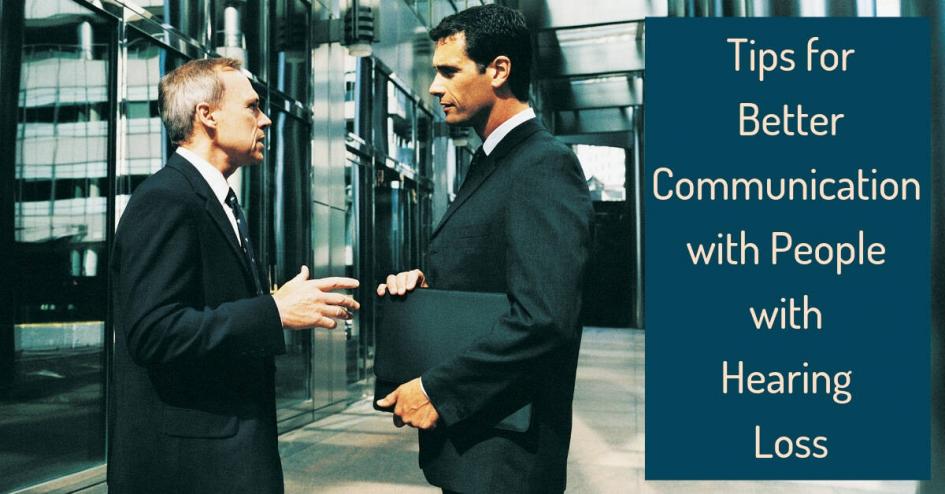
Tips for Better Communication with People with Hearing Loss
Those who suffer from hearing loss can find it very difficult to communicate with other people. It’s something we take for granted as long as our ears are healthy, but when something so basic as our hearing is compromised, understanding others becomes a difficult task. Even those with hearing aids may find communication a challenge at times, especially if they are using a hearing aid that can only be used in particular environments, like one-on-one situations. The inability to physically communicate leads to a whole host of psychological effects for the person with hearing loss. Frustration arises because many see it as the first sign of ageing, and the beginning of the loss of independence. For men especially, this can be difficult to come to terms with. It is perhaps no surprise that many choose to isolate themselves from others, rather than face the frustration of not being able to hear others well. This is a sure-fire recipe for social isolation. Social isolation is a growing problem in developed economies such as the UK. And it is dangerous – according to the former Surgeon General of the United States, isolation is akin to a “reduction in lifespan similar to that caused by smoking 15 cigarettes a day.” According to other studies on the topic, social isolation increases levels of stress hormones in the body and leads to poor sleep, a weaker immune system and a greater risk of cognitive decline and dementia.
The solution
It makes sense then to keep meeting our friends and family members even if we have hearing loss. Here are some ways to help maintain these lines of communication if and when hearing loss arises.
1. Let people know about the hearing loss
This might be the hardest advice to follow, but it is invaluable – people are surprisingly accommodating once they know that you have some trouble hearing. Your family and friends will no doubt understand and will be willing to change their style of communication to make it easier for you to understand. It might even explain a lot to them, especially if they were wondering why you were sometimes not involved in a particular conversation, or not laughing at their best jokes.
2. Keep a close distance
The hearing charity Action on Hearing Loss recommends you stand close to the person you are talking to. You will be able to see facial expressions and it will be easier to lip read if you have to resort to that. If your hearing is better in one ear than the other, turn to the side where your friend is speaking. For friends and others, don’t be afraid to ask your conversation partner to speak into one ear, or change sides so that they are talking into your preferred ear. Remember that their main goal is to communicate smoothly with you and they will be happy to comply with your requests. If you regularly attend meetings at work, choose a seat closer to the front, for the same reasons stated above. One added bonus is that you will look like the most eager beaver in the room! But if the meetings use a PA system or similar, be careful not to sit too close to the speaker, as this can wreak havoc if you are wearing a hearing aid.
3. Understand non-verbal communication
Without being aware of it, people can convey a lot of information through their facial expressions. For example, tugging of the lips can indicate worry or fear. And raised eyebrows can mean the person is anxious or stressed. Even something as innocuous as the way a person sits on a chair can also communicate a lot. Are they on the edge of their chair? They probably want to add something to the conversation. Likewise, a slouch can mean that they either don’t agree or are uninterested in your conversation.
4. Use a hearing aid, and get the most out of them
If you are using a hearing aid, consult with us at House of Hearing on how you can make the most of it. Get to know the settings that help you in the toughest environments. Also, the proper fitting for heating aids can make them more comfortable to wear, and can increase performance. It also reduces the risk of it falling out at the most inopportune times. Finally, you might want to upgrade your existing hearing aid to a newer one. Modern hearing aids come with features that help you hear better in noisy environments, and have different settings so you are able to handle both noisy and quiet spaces with ease. If you are not using a hearing aid, then you might be able to guess the next piece of advice – get one! They make a world of difference in the ease of your communication with others.
For improved communication, get in touch with House of Hearing
There is no reason to suffer the frustration of hearing loss when hearing aids can provide so much relief. For a comprehensive evaluation and expert guidance on the best hearing loss treatment, schedule your appointment with House of Hearing today.
Our Clinics
All House of Hearing clinics are in town centre locations and accessible to public transport and parking. Home visits also available if mobility is an issue.


.png)
.png)
.png)

.png)
